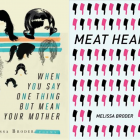The Ploughshares Round-Down: That Time A Famous Author Failed And Blamed Ebooks
Last year, I was talking to a romance novelist who self-publishes her books. She had decided to go this route after submitting a manuscript directly to Harlequin and not hearing back from them for months.
 What forced her hand was that she had kids, she had been working part-time, and her husband had just been laid off. If she could make a thousand dollars over the life of the book, she figured, that was better than sitting in the slush pile, and it was cash she could use for groceries.
What forced her hand was that she had kids, she had been working part-time, and her husband had just been laid off. If she could make a thousand dollars over the life of the book, she figured, that was better than sitting in the slush pile, and it was cash she could use for groceries.
In fact, she made a few thousand dollars. She kept writing and publishing and that turned into a few thousand a month, and then tens of thousands of dollars a month. By the end of the first two years she had made well over a million dollars on ebooks. I just checked, and she’s still ranked in the top twenty on Amazon for romance novelists. (She isn’t just lucky; she happens to write the best sex scenes I’ve read anywhere, by any writer.)
I thought of her after reading the most interesting article I’ve encountered in the past two weeks, by Tony Horwitz, author of Confederates in the Attic. He wrote an op-ed for the New York Times entitled “I Was A Digital Bestseller.” In his article, he explains that not only is he not a millionaire from his ebook on gas fracking, he actually lost money on it. His conclusion was that he’s “wary of this brave new world of digital publishers and readers.” Many other blogs and websites responded to his article with similar opinions, too.
What they all missed is that, in this case, going digital has little to do with it.
What Went Down
Tony Horwitz has written for the New Yorker and won a Pulitzer. He’s written numerous bestsellers. His last three books have sold, I would guess, between fifty thousand and one hundred thousand copies each. He’s a nonfiction star, and I suspect he will continue to be for some time going forward. I am not surprised, as he said, that he typically receives “advances large enough to fund years of research.”
However, for his first foray into digital publishing, he accepted a more modest assignment from a website called The Global Mail, who planned to co-publish a novella-length piece of investigative journalism with mini-ebook purveyor Byliner. Long story short, he spent more than he was supposed to be paid, both outlets faltered, and he sold only a thousand copies of this particular book, Boom.
In his op-ed, Horwitz calls his book a bestseller, and tries to warn authors everywhere away from the delusions of profit that often come with successful digital publishing. Gawker (a publication I admit I love) took the bait, headlining their squib about his piece “It Turns Out That Being a ‘Digital Bestseller’ Completely Sucks.” The American Conservative ups the ante by recommending people “read his tale of having written a No. 1 digital bestseller, which was nearly a disaster.”
Horwitz bases his claim of best-seller-dom in part on the fact that Boom was ranked, for a time, in the number one slot in the category of “Page-Turning Narratives.” Since this op-ed ran, he has moved up to second place in the nonfiction Kindle Single rankings. And his book, as I write this, is also #486 overall on Amazon, which is pretty good too.
However, these things make him a number one bestseller only in the sense that having a “World’s Best Dad” mug makes me a parenting expert; they don’t really justify Horwitz’s claim that he was “a nonfiction digital best seller!” (In fact, be skeptical of anyone’s bestseller claim unless they have the particular list attached to it, as in “USA Today bestseller.”)
Is One Thousand Copies Really That Bad?
First, let’s talk about sales in general. For a new hardcover and concurrently published ebook, things like Amazon rankings are not a reliable way to measure success. Instead, as with traditional publishing, you need to look at the hard sales figures: breaking into the printed New York Times bestseller lists usually puts you on your way to fifty thousand copies.
Sell twenty-five thousand copies and you’ve at least transcended a single niche, and maybe just barely made the Times extended list. Sell eight thousand copies over the life of a book, and you can say you probably found a niche and conquered it, but you’re definitely not a bestseller. In my experience these estimates generally hold for mini-books like Boom, too, even though Kindle Singles are both shorter and cheaper.
Horwitz tells us that, in the end, Boom only barely crept over the one thousand mark, and he calls it a cruel joke that this made Boom “a top-rated seller.” He’s right, obviously, that a thousand copies is pretty bad and shouldn’t be considered a success. But most people in the industry wouldn’t see it as one, because selling a thousand copies or less is very common, not just for digital books, but for books from traditional New York publishers.
Sales data for ebooks are not available anywhere, but here are two reasonable formulas for guessing at life sales (across all formats) for recent books from publicly available information: for fiction books, just multiply the number of Goodreads ratings by fifteen; for nonfiction books, multiply them by twenty and add that to one hundred times the number of Amazon reviews. It’s not perfect, but most of the time it will provide estimates in the right ballpark.
Go look a few up. You might be surprised how gigantic or how horrifying the sales have been for some of your favorite recent titles.
Ebooks Are Not The Problem, Not Even Close
Horwitz pins a lot of blame for Boom‘s poor performance on his digital-only publishers and therefore, it seems, on digital publishing in general. After all, he has written successful print books in the past, and the most obvious difference with Boom was its digital format. Horwitz concludes by questioning “whether there’s an audience large enough to sustain long-form digital nonfiction, in a world where we’re drowning in bite-size content that’s mostly free and easy to consume.” Could there be any truth to this idea? Are there no “digital” readers who want to pay to read long things anymore?
I don’t think so. Take a look at the Amazon bestseller list. The physical editions and ebook editions of most books are usually not far apart. If people don’t like to read long things on their e-readers, no one told all those people buying Hillary Clinton’s memoir.
Right after his claim about the death of long-form nonfiction, however, he admits there might be another factor at play: “One reason Boom sank, I suspect, is that there aren’t many people willing to pay even $2.99 to read at length about a trek through the oil patch, no matter how much I sexed it up with cowboys and strippers.” It could be that digital publishing is fundamentally flawed, or it could be that every book about gas fracking has tanked, including his. He’s not the first bestselling writer to publish a clunker because he misjudged the public’s interest in his topic.
The Chicken and E-gg problem
Horwitz did run into a problem with the format, I’ll admit. Any new hardcover he publishes will get him plenty of publicity, and he has fans who will come to it. However, from public radio producers to book reviewers to Amazon browsers, most of us still assume an nonfiction ebook original is an ebook original because the topic was too small and the content too unpolished to be a “real” book. It looks like distinctly skippable, even for fans of the author, even when the underlying material is sound.
This could be an unfair prejudice against ebook originals, obviously, but in this case, it appears to be correct. If a writer as respected as Tony Horwitz (or his agent) thought a publisher would have paid six figures for a print book about fracking, it probably wouldn’t have been an ebook to begin with.
So until more nonfiction authors go the route of self-publishing romance novelists—and that day may not come in my lifetime—direct-to-ebook nonfiction books will continue to be perceived as the direct-to-DVD products of the literary world. Meanwhile, at least in genres where there’s no stigma against ebook originals, the real digital best sellers will continue to do just fine.



